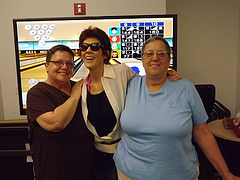This year’s theme for Older Americans Month is “Get into the Act.” Although unintended, the theme made me think of how often LGBT older adults have had to “act” throughout their lives – whether it was living in the closet growing-up in a time and place when it was not acceptable to be out – or the unfortunate number who feel compelled to go back into the closet as they get older and enter places where they feel more vulnerable and don’t feel safe or comfortable being out. The bottom line, of course, is that after spending a lifetime of trying to get out of the closet, LGBT older adults have earned the right to grow older in places where they don’t need to act straight and/or cis-gender, but where they can be their authentic selves.
 The Older Americans Act (OAA) is turning 50 this year. It serves as the country’s leading vehicle for delivering services to older people nationwide, providing more than $2 billion annually in nutrition and social services. Since its enactment, the OAA has aimed to ensure that older people have the supports they need to age in good health and with broad community support. And what better time to look at the act and celebrate all that it has accomplished to enable all older adults, including LGBT older adults, to grow old and age with independence, dignity, and respect in their own communities.
The Older Americans Act (OAA) is turning 50 this year. It serves as the country’s leading vehicle for delivering services to older people nationwide, providing more than $2 billion annually in nutrition and social services. Since its enactment, the OAA has aimed to ensure that older people have the supports they need to age in good health and with broad community support. And what better time to look at the act and celebrate all that it has accomplished to enable all older adults, including LGBT older adults, to grow old and age with independence, dignity, and respect in their own communities.
It’s also a good time to consider that this primary vehicle for the delivery of supports and services to older adults makes no mention of LGBT older adults. Due to be reauthorized, SAGE is mindful that at some point in the near future, whether it’s through administrative change or legislative change, it’s necessary for this all-important piece of aging legislation to explicitly include LGBT older adults. This means, among other things, that through data collection, we might once and for all come to understand the degree to which aging programs and services are reaching and meeting the needs of LGBT older adults. And to the extent LGBT older adults are not being reached, by having targeting language, the aging network will need to step up to the plate and target services and supports to LGBT older adults.
The goal of the Older Americans Act, is in part, to reach those who are most vulnerable. Unfortunately, LGBT older adults all too often fit the bill. As we celebrate Older Americans Month it’s time for the Older Americans Act to ensure that LGBT older adults will no longer need to act, but can be their authentic selves, and get the services and supports they need. Interested in making your voice heard? Fill out our survey on LGBT voices that we’ll be taking to The White House in July for the White House Conference on Aging!
The opinions expressed in this article are those of the author and do not necessarily reflect those of the Diverse Elders Coalition.

